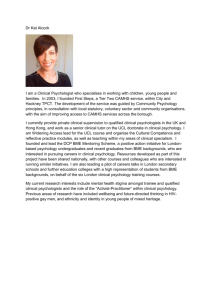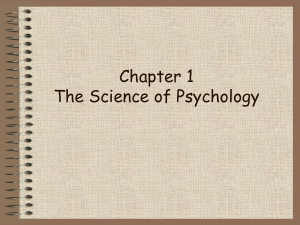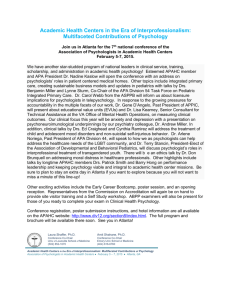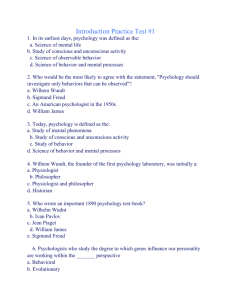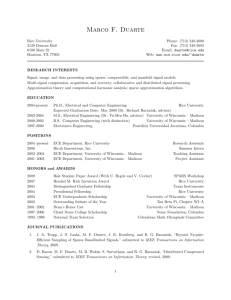Word Doc
advertisement
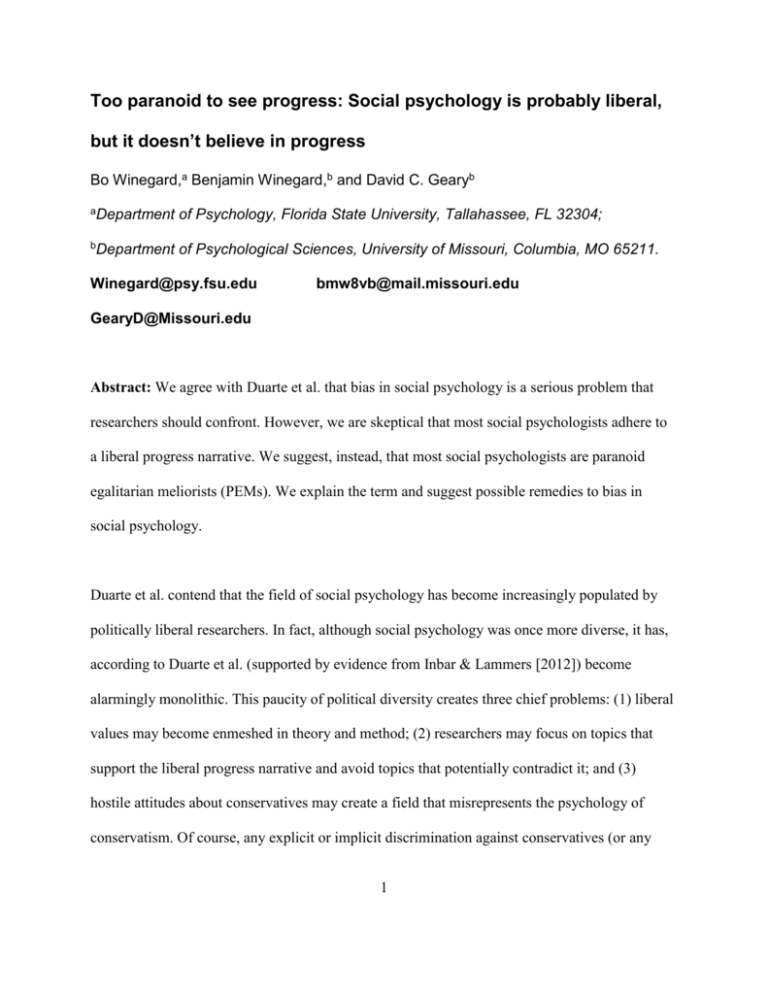
Too paranoid to see progress: Social psychology is probably liberal, but it doesn’t believe in progress Bo Winegard,a Benjamin Winegard,b and David C. Gearyb aDepartment of Psychology, Florida State University, Tallahassee, FL 32304; bDepartment of Psychological Sciences, University of Missouri, Columbia, MO 65211. Winegard@psy.fsu.edu bmw8vb@mail.missouri.edu GearyD@Missouri.edu Abstract: We agree with Duarte et al. that bias in social psychology is a serious problem that researchers should confront. However, we are skeptical that most social psychologists adhere to a liberal progress narrative. We suggest, instead, that most social psychologists are paranoid egalitarian meliorists (PEMs). We explain the term and suggest possible remedies to bias in social psychology. Duarte et al. contend that the field of social psychology has become increasingly populated by politically liberal researchers. In fact, although social psychology was once more diverse, it has, according to Duarte et al. (supported by evidence from Inbar & Lammers [2012]) become alarmingly monolithic. This paucity of political diversity creates three chief problems: (1) liberal values may become enmeshed in theory and method; (2) researchers may focus on topics that support the liberal progress narrative and avoid topics that potentially contradict it; and (3) hostile attitudes about conservatives may create a field that misrepresents the psychology of conservatism. Of course, any explicit or implicit discrimination against conservatives (or any 1 other group of people) that is not based on scientific criteria should be eliminated from social psychology. To this end, Duarte et al.’s review provides a welcomed and useful evaluation of the current state of the field. We have some concerns, however, with Duarte et al.’s promotion of Christian Smith’s “liberal progress narrative” (see Smith 2003). We believe that the term paranoid egalitarian meliorism (PEM) more accurately characterizes the attitude of many social psychologists. We suggest that PEM may lead to many of the symptoms that Duarte et al. accurately diagnose. Duarte et al. propose that many social psychologists adhere to what Smith called the “liberal progress narrative” (LPN) (Smith 2003, p. 82). This narrative may bias the field because it may insidiously motivate researchers to pursue inquiries consistent with this belief system while ignoring other, potentially contradictory investigations. The LPN views history as a battle against unjust and oppressive institutions and regimes. Gradually, according to the LPN, freedom has flowered and the righteous forces of democracy and equality have triumphed over the darkness of concentrated social and economic power. However, many injustices still remain and still deserve the devoted attention of morally righteous people. Although there is some truth to Duarte et al.’s argument regarding the LPN, we believe that it mischaracterizes the political narrative/attitude that most social psychologists hold. In fact, informal evidence suggests that many social psychologists are hostile to whiggish notions of “progress” and consider it indecent to trumpet cultural successes while ignoring the many real or perceived injustices that free markets and technology have birthed. For example, although this is anecdotal and requires further substantiation, our experience suggests that many social 2 psychologists were either indifferent or actively hostile to Steven Pinker’s extremely whiggish (essentially a LPN manifesto) The Better Angels of Our Nature (Pinker 2011a), which documents the incredible secular decline in human violence. Furthermore, at least a few prominent social psychologists have written books lamenting the growing threat of violent media, the rising trend of narcissism, and the increasing misery of today’s youth – all narratives that contradict the basic tenets of progress. We suggest, instead, that many social psychologists adhere to a brand of liberalism that is strongly colored by the attitude of paranoid egalitarian meliorism (PEM). We do not mean paranoid pejoratively; rather we mean it as a form of error-management (Haselton & Nettle 2006). In this view, paranoid refers to a heightened sensitivity to perceive injustices and/or threats to equality. Because of this, many social psychologists (a) study topics that are related to perceived injustices (stereotyping, prejudice, hierarchies, immorality of the wealthy, obedience); (b) ignore topics that are perceived to threaten egalitarianism (heritability, stereotype accuracy, possible benefits of conformity/hierarchy); and (c) become hostile/biased against research which suggests that some outcome differences among individuals and/or groups are at least partially caused by differences in personal traits rather than by discrimination or social oppression (e.g., that sex differences in science, technology, engineering, and mathematics (STEM) fields are partially caused by the cognitive differences and the different occupational preferences of men and women and thus not entirely caused by unjust hiring practices or prejudices). At its most extreme, PEM can lead to the creation of perceived victim groups who become quarantined from objective scientific analysis. Protection of such perceived victim 3 groups becomes a sacred value (Tetlock 2003), and those who are perceived as violating this sacred value are assailed. Biased reviews, funding, and hiring decisions are justified because they are a means to protecting a sacred cause. Consider the example of STEM-field representation given above. Because women are a perceived victim group, the dispassionate and disinterested study of STEM-field representation is almost impossible in social psychology. Those who suggest that the disparate representation is caused at least partially by personal traits are often attacked, denied access to top-tier journals, and forced to adhere to much more rigorous scientific standards than those who argue that the disparate representation is entirely socially caused. In general, PEM disdains scientific analyses that posit that personal variables may explain some variation in outcomes, because such analyses are seen as “blaming the victims.” Although this is, as we noted, an extreme outcome of PEM, it requires only a small percentage of passionate advocates to potentially distort the review, hiring, and tenure processes. We, of course, are dedicated to tolerance, diversity, and equality of treatment. Furthermore, we believe that social science can and should be used to help us better understand society so that we can improve the life of all people, especially those who are particularly vulnerable. However, this should be achieved by pursuing the truth regardless of however temporarily unpleasant it may be to some people. Perhaps social psychologists should attempt to mimic medical researchers. Many medical researchers are passionately committed to the cause of improving peoples’ well-being. However, that passionate commitment does not interfere with objective analyses of susceptibility rates. One may think it unjust that some groups (e.g., men or women) are at greater risk for certain maladies, but that doesn’t prevent researchers (and the Centers for Disease Control and Prevention) from noting the heightened risk and advocating 4 potential preemptive action (e.g., advocating that sexually active women get HPV vaccinations). It may offend some people’s moral sensibility that some groups are more vulnerable to certain diseases than others, but it is just a fact that we have to live with. If increasing the number of conservatives in psychology will help to achieve this end, then we endorse Duarte et al.’s recommendations. The important thing is getting the science right. Haselton, M. G. & Nettle, D. (2006) The paranoid optimist: An integrative evolutionary model of cognitive biases. Personality and Social Psychology Review 10:47–66. [BW] Inbar, Y. & Lammers, J. (2012) Political diversity in social and personality psychology. Perspectives on Psychological Science 7(5):496–503. [BW] Pinker, S. (2011a) The better angels of our nature: Why violence has declined. Viking. [BW] Smith, C., ed. (2003) The secular revolution: Power, interests, and conflict in the secularization of American public life. University of California Press. [BW] Tetlock, P. E. (2003) Thinking the unthinkable: Sacred values and taboo cognitions. Trends in Cognitive Sciences 7:320–24. [BW] 5




